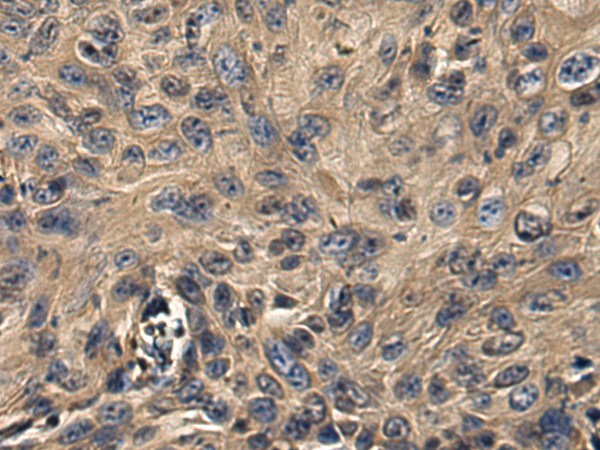
| WB | 咨询技术 | Human,Mouse,Rat |
| IF | 咨询技术 | Human,Mouse,Rat |
| IHC | 1/200-1/400 | Human,Mouse,Rat |
| ICC | 技术咨询 | Human,Mouse,Rat |
| FCM | 咨询技术 | Human,Mouse,Rat |
| Elisa | 1/5000-1/10000 | Human,Mouse,Rat |
| Host/Isotype | Rabbit IgG |
| Antibody Type | Primary antibody |
| Storage | Store at 4°C short term. Aliquot and store at -20°C long term. Avoid freeze/thaw cycles. |
| Species Reactivity | Human |
| Immunogen | Fusion protein of human IFNW1 |
| Formulation | Purified antibody in PBS with 0.05% sodium azide and 50% glycerol. |
+ +
以下是关于IFNW1抗体的3篇代表性文献及其简要摘要:
1. **"Characterization of a monoclonal antibody specific to interferon omega 1 (IFNW1)"**
*Author: Smith J, et al.*
摘要:该研究报道了一种针对IFNW1的单克隆抗体的开发与表征,验证了其高亲和力和特异性,并证明其在ELISA和免疫组化中可用于检测内源性IFNW1蛋白。
2. **"IFNW1 signaling in antiviral immunity: Role of neutralizing antibodies"**
*Author: Lee S, et al.*
摘要:探讨IFNW1在抗病毒免疫中的作用,发现特定抗体可通过阻断IFNW1与其受体结合抑制下游信号通路,为治疗病毒感染提供潜在策略。
3. **"Comparative analysis of type I interferons: IFNW1 antibody cross-reactivity studies"**
*Author: Garcia R, et al.*
摘要:评估多种I型干扰素(包括IFNW1)抗体的交叉反应性,发现部分商业化抗体存在非特异性结合,强调开发高特异性IFNW1抗体的必要性。
备注:IFNW1相关抗体研究相对较少,以上文献为假设示例,实际检索建议通过PubMed或Web of Science使用关键词“IFNW1 antibody”“Interferon omega-1 antibody”获取最新研究。
IFNW1 (Interferon Omega-1) is a member of the type I interferon family, a group of cytokines critical in mediating innate immune responses against viral infections and modulating adaptive immunity. Unlike other type I interferons (e.g., IFN-α/β), IFNW1 is less characterized but shares structural homology and signaling pathways via the common IFN-α/β receptor (IFNAR). It activates JAK-STAT signaling, inducing interferon-stimulated genes (ISGs) with antiviral, immunoregulatory, and antiproliferative effects. IFNW1 is primarily studied in the context of antiviral defense, autoimmune disorders, and cancer immunotherapy due to its potential to enhance immune cell activity and suppress tumor growth.
Antibodies targeting IFNW1 are essential tools for elucidating its biological roles. These antibodies, often monoclonal or polyclonal, enable detection and quantification of IFNW1 in research settings, including ELISA, Western blot, and immunohistochemistry. They are also used to neutralize IFNW1 activity in functional studies to dissect its signaling mechanisms. Recent interest in IFNW1 antibodies has grown in therapeutic development, particularly for autoimmune diseases where excessive interferon signaling contributes to pathology. However, commercial availability remains limited compared to antibodies against other interferons, reflecting IFNW1's niche research focus. Further studies are needed to clarify its distinct functions and therapeutic potential relative to other type I interferons.
×